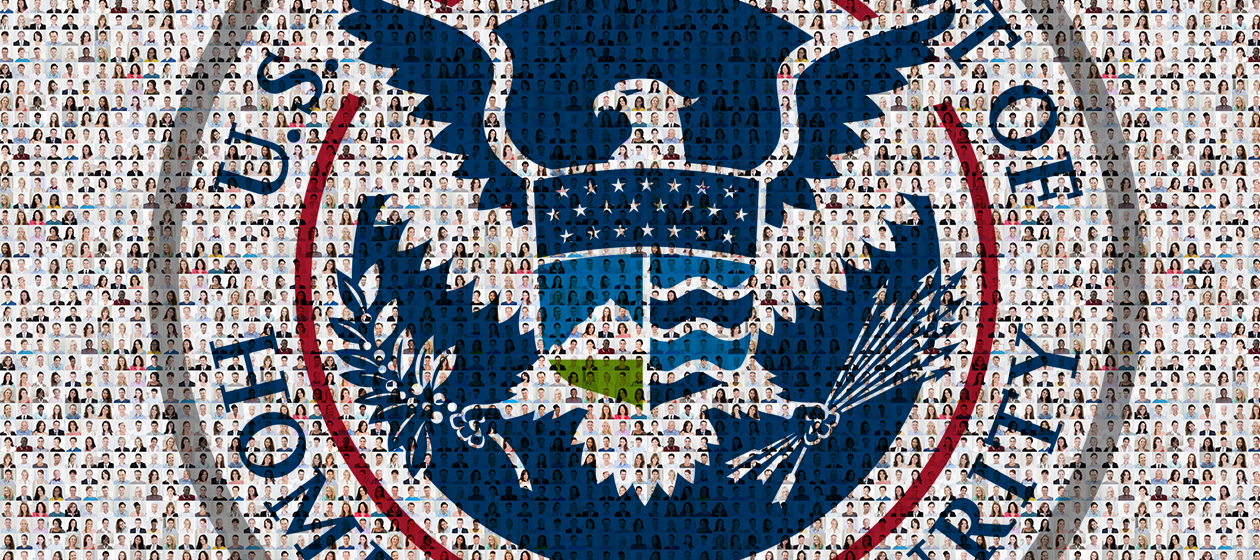The government's creepy obsession with your face
Uncle Sam wants you(r face data and DNA)


A free daily email with the biggest news stories of the day – and the best features from TheWeek.com
You are now subscribed
Your newsletter sign-up was successful
The government is obsessed with your face. Do not be flattered. This is more of a creepy stalker fixation.
From the federal Department of Homeland Security down to local police departments, governmental use of biometric facial recognition software has gained a startling amount of traction in recent years. And these agencies are getting help from big business, to boot.
For example, DHS is reportedly developing a massive new biometric and biographic database with extensive data on citizens and foreigners alike. The Homeland Advanced Recognition Technology (HART) database will reportedly include at least seven biometric identifiers, including face and voice data, tattoos, DNA, scars, and other "physical descriptors" on as many as 500 million people. The agency has been remarkably hush-hush on how HART will be utilized — but the possibilities are frightening.
The Week
Escape your echo chamber. Get the facts behind the news, plus analysis from multiple perspectives.

Sign up for The Week's Free Newsletters
From our morning news briefing to a weekly Good News Newsletter, get the best of The Week delivered directly to your inbox.
From our morning news briefing to a weekly Good News Newsletter, get the best of The Week delivered directly to your inbox.
DHS expects to launch the new database next fiscal year, according to internal documents. By the following year, they anticipate having iris and facial matching capabilities, and by fiscal year 2021, the database is expected to be functioning in its full capacity. This massive and intrusive initiative will grant a whole host of federal, state, and local agencies access to intimate details about hundreds of millions of Americans and foreigners.
Here's how the government casts that:
"When HART is fully operational, it will offer a broader range of services to federal government agencies, state and local law enforcement, the intelligence community, and international partners," a DHS spokesman said in a press release. "HART will provide DHS with a flexible, scalable, and more efficient biometric system that supports core DHS missions and operations for the future."
In other words, DHS will know everything from what you look like to your birthday to any government ID numbers you may have. And, in a clear erosion of due process and privacy expectations, they'll be empowered to share this data with local and state police.
A free daily email with the biggest news stories of the day – and the best features from TheWeek.com
While HART will be the most expansive biometric database to date, DHS isn't the first federal entity to take an interest in using facial identification. As of 2015, the FBI's Next Generation Identification (NGI) database held records on nearly one-third of the American population, including 52 million mugshots. Half of the states in the country are either actively using NGI or have expressed interest in using it, according to the Electronic Frontier Foundation.
The fetishizing of facial recognition as a must-have for law enforcement doesn't stop at the federal level. Last month, Amazon announced it is selling its facial recognition software, known as Rekognition, to local police departments all over the country. This would allow law enforcement to cross reference surveillance camera footage from a crime scene with Amazon's collection of "tens of millions" of faces.
This all amounts to a gross violation of Americans' privacy and civil liberties — and in no small part because these technologies are not only abusively obtrusive, but often wrong. Indeed, the data on the efficiency of facial recognition is shaky at best. Researchers at MIT have found that these devices and software are essentially useless when it comes to recognizing the face of a person of color. There's a 12 percent chance the device cannot even recognize the person's gender, let alone their exact identity, if they are of darker complexion.
Granting DHS access to biometric data about hundreds of millions of people, and allowing local law enforcement to use unproven facial recognition technology in criminal investigations, should strike fear into anyone who ever leaves their house. This sort of biometric intrusion goes far beyond the legitimate purview of our government. Our faces are our own.
Dan King is a Young Voices Advocate, journalist, and digital communications professional based in Arlington, Virginia. His work has appeared at National Review, Reason, and the Weekly Standard.
-
 What is the endgame in the DHS shutdown?
What is the endgame in the DHS shutdown?Today’s Big Question Democrats want to rein in ICE’s immigration crackdown
-
 ‘Poor time management isn’t just an inconvenience’
‘Poor time management isn’t just an inconvenience’Instant Opinion Opinion, comment and editorials of the day
-
 Bad Bunny’s Super Bowl: A win for unity
Bad Bunny’s Super Bowl: A win for unityFeature The global superstar's halftime show was a celebration for everyone to enjoy
